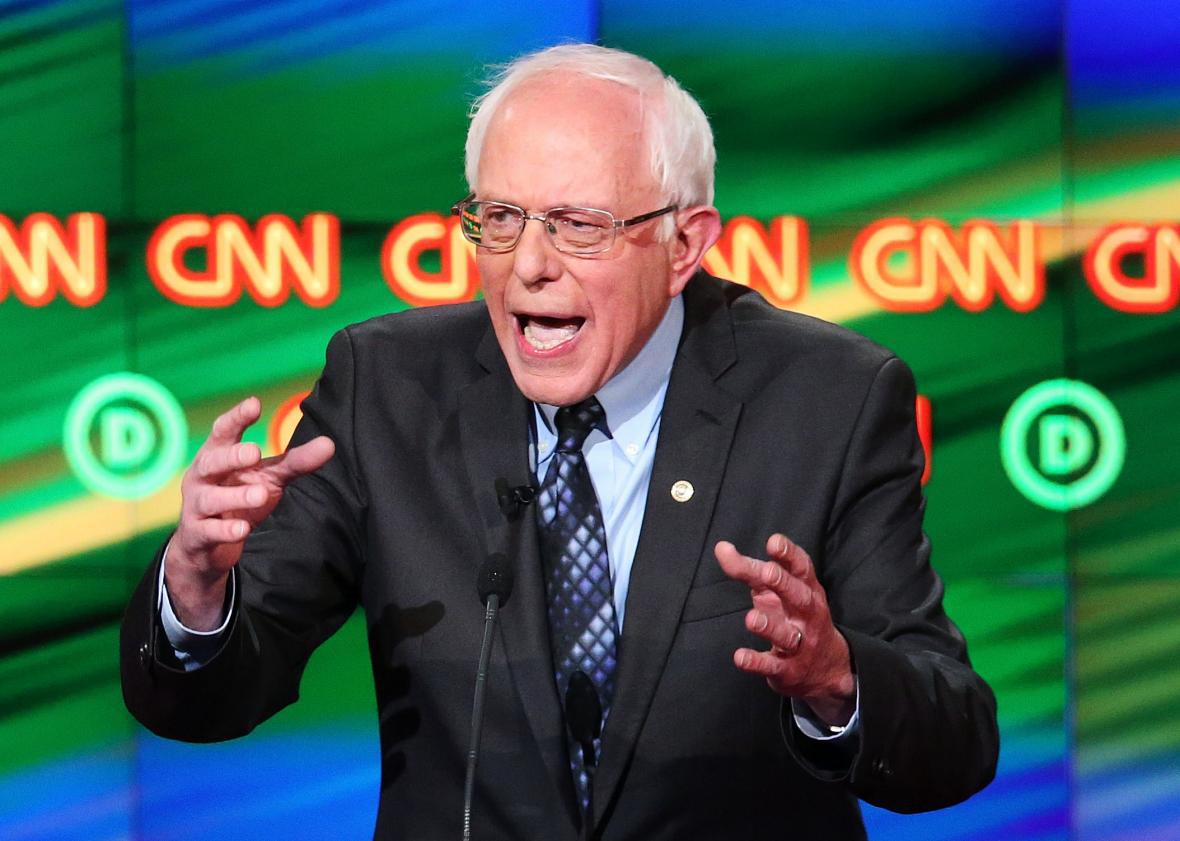The Democratic nomination is Hillary Clinton’s to lose. With 20 nominating contests in the books, the former secretary of state holds a commanding lead in the pledged delegate race and an even larger one among superdelegates. Those advantages are only likely to grow as the race heads to delegate-rich states where she holds massive leads in the polls, like Michigan on Tuesday, and Ohio and Florida one week later. This weekend, though, demonstrated that Bernie Sanders isn’t ready to pack it in just yet. Not even close.
Only minutes before the two stepped onto the CNN debate stage in Flint, Michigan, on Sunday night, Sanders was declared the winner of the Maine caucus, his third victory of the weekend and his eighth of the year. During the two hours that followed, Bernie and Hillary clashed repeatedly on everything from government bailouts to free trade to Obamacare. The debate was a classy affair compared to what we saw on the Republican stage three days ago when the Fox News debate turned into an actual dick-measuring contest. Still, Sunday’s action left little doubt that Sanders will do everything he can to prevent Clinton from declaring the race over and turning her full attention to the general election. For Hillary’s part—with the other aisle in apparent disarray—she seems happy to abide him for the moment.
The tension between Clinton and Sanders was evident throughout the night. Bernie refused to cede the stage to Hillary on multiple occasions—“Can I finish? You’ll have your turn,” he snapped at one point—and he went out of his way to press her on her refusal to release transcripts of her paid speeches to Wall Street institutions like Goldman Sachs. Sanders also attacked his rival for not opposing the Trans Pacific Partnership sooner (“I am very glad … that Secretary Clinton discovered religion on this issue, but it’s a little bit too late”), for not opposing fracking strongly enough, and for relying on super PAC cash.
Clinton, meanwhile, continued to paint Sanders as a “one-issue candidate.” This time, she specifically used that criticism to hit Sanders for voting against the auto bailout, a particularly sensitive topic in Michigan. As she has been for months, Hillary also reminded liberals of perhaps the biggest blemish on Bernie’s progressive resume: his vote to shield gun-makers and dealers from lawsuits.
Few of the attacks from either candidate were new—but their postures onstage made it clear that even if the ultimate outcome of the nomination may soon be a foregone conclusion, the fight over what the Democratic Party stands for will go on. Sanders has the money and motivation to continue his campaign for the foreseeable future, while Clinton appears uninterested in coasting into the general election by simply playing defense. It is also noteworthy that it wasn’t until toward the end of the CNN debate that either candidate mentioned the man they’d be most likely to face in the general election: Donald Trump. “I have said, and I will repeat here, I think that Donald Trump’s bigotry, his bullying, his bluster are not going to wear well on the American people,” Clinton said after noting that she’s the only candidate in the race with more votes than Trump this election cycle. Clinton appears content to continue to let the Republican Party tear itself apart while she attempts to unify her own party.
This weekend did nothing really to stanch the bleeding for Sanders. Despite his winning three of the four states up for grabs, the result was effectively a push in the delegate race given that Hillary won the weekend’s fourth contest—in Louisiana—by such a wide margin. By most estimates, Clinton now leads Sanders by nearly 200 pledged delegates, an advantage that grows to more than 600 when you factor in superdelegates.
At this point, Hillary is nearly halfway to the 2,383 delegates she needs to lock up the nomination. And, unlike in the GOP race, Democrats don’t hold winner-take-all contests, which makes mounting a comeback considerably more difficult for a candidate who falls behind early. The inverse of that, though, is that it will take time for Clinton to amass enough delegates to end Sanders’ campaign outright. Sunday’s debate suggests both candidates are well aware of that reality, and neither of them has a particular problem with it.
